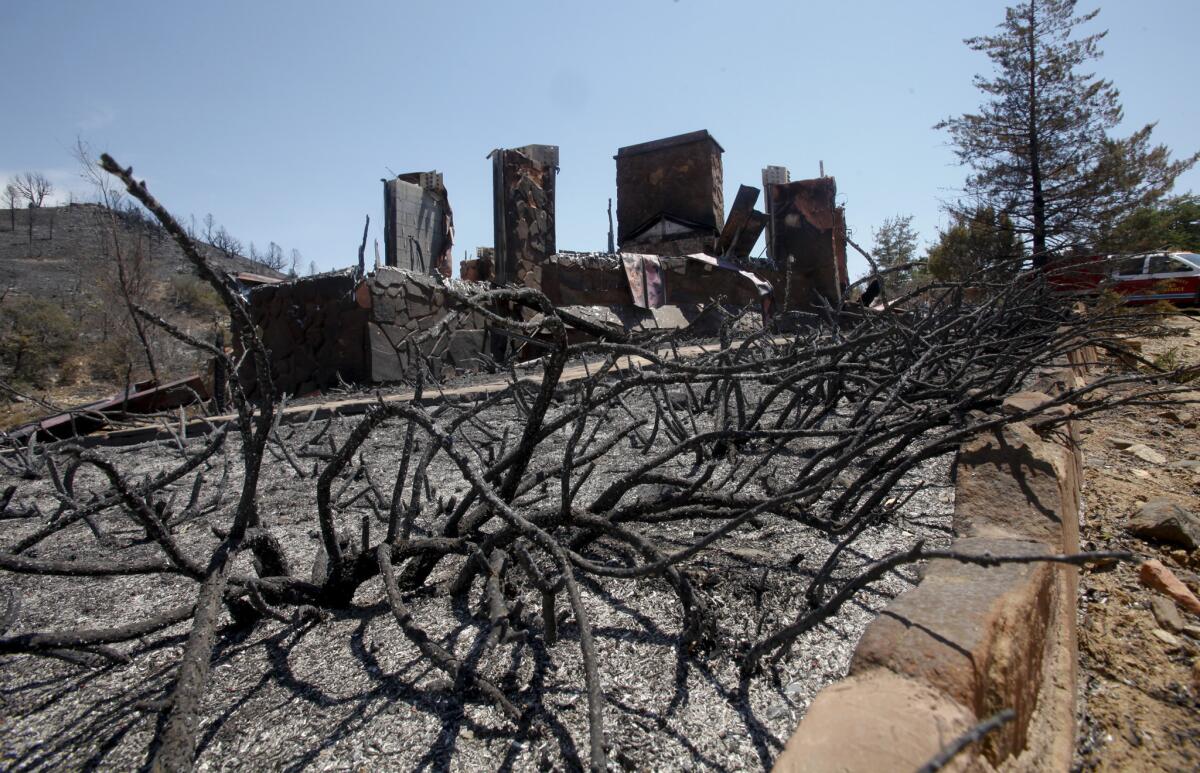Arizona homeowners allege negligence in fighting Yarnell Hill fire

Ninety-one residents who lost their homes in the Yarnell Hill fire in June have filed claims against the state, local government and fire agencies, accusing them of negligence, recklessness and intentional misconduct in managing the summer blaze that killed 19 firefighters and destroyed 8,000 acres of wild land and more than 100 dwellings.
Residents had until Friday to file a “notice of claim,” which is a precursor to a lawsuit.
The claims contend that the people of Yarnell, Glen Ilah, Peeples Valley and surrounding areas suffered “property damage, lost or diminished income and earning potential, personal injuries emotional harm or emotional distress and other tortuous injuries, damages, harms and losses” due to mismanagement of the Yarnell Hill fire, which started June 28.
The city of Prescott, Yavapai County, the state of Arizona, and the Yarnell Fire District either refused to comment or did not return calls for comment.
Nina Bill Overmyer and her husband, Chuck, who lost their Tudor-style home in Glen Ilah during the blaze, said they just want the truth and hope the legal process will reveal more facts about the fire. The claims seek various amounts; the one filed by the Overmyers seeks $1.3 million.
“I mean, everyone is pointing fingers to everyone else and nobody is telling the truth. Nobody is accepting responsibility for this,” Overmyer said.
The couple says agencies should have attacked the fire more forcefully when it first erupted, instead of waiting two days to deploy more resources.
Overmyer said they lost everything in the fire.
“I’m fourth-generation native Arizonan and I have lost so much family history … photos, autographed books about my family and family ranches,” she said.
The claims are just the latest in a string of actions taken against state and local fire officials. Some family members of the 19 firefighters who were overrun by flames have also filed notice of claims against the same agencies.
Marcia McKee, whose son, Grant McKee, was one of the 19, is seeking $36 million in her claim, stating that fire management negligence led to the death of her son.
Last week, the Arizona State Forestry Division contested $559,000 in citations and fines levied against the agency by a state safety commission, which found it put protection of structures over firefighter safety during the blaze.
Earlier this month, the Arizona Industrial Commission voted unanimously to accept the findings of a safety report that found the members of the Granite Mountain Interagency Hotshot Crew were the victims of poor planning and bad communication, forced into a losing battle to protect structures and pasturelands that were “indefensible.”
The report, which was prepared by independent consultants to the Arizona Division of Occupational Safety and Health, also found that the firefighters were called on to fight the fast-moving blaze outside the town of Yarnell with inadequate briefings, poor maps and radios that provided spotty communication with incident commanders.
The report found a combination of safety violations during the blaze, including lack of crucial personnel, incomplete analysis and hours-long delays.
The safety agency’s report is a departure from a September report that found no evidence of recklessness or negligence in the Yarnell Hill wildfire. That report was commissioned by the state forestry division, the same agency which is now subject to the workplace safety penalties.
Experts have said that the city of Yarnell and its subdivision of Glen Ilah were not prepared for a wildfire of such magnitude.
Using satellite images and mapping software, researchers at the Pacific Biodiversity Institute found that most of the 569 buildings in Yarnell did not have proper buffer zones — areas sufficiently cleared of chaparral, shrubs and trees. Only 63 buildings had appropriate buffer zones, and 95% of them survived the fire, the group found.
Overmyer said she had an estimated 50-foot clearance around her home and had made sure to cut back the trees from the building.
Still, nothing was saved, she said.
“That fire was so hot, it melted glass. There was not one stitch of glass. It was melted,” Overmyer said. “That’s how hot the fire was.”
Twitter: @thecindycarcamo
More to Read
Sign up for Essential California
The most important California stories and recommendations in your inbox every morning.
You may occasionally receive promotional content from the Los Angeles Times.











